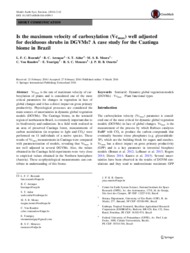Is the maximum velocity of carboxylation (Vcmax) well adjusted for deciduous shrubs in DGVMs: a case study for the Caatinga Biome in Brazil.
Is the maximum velocity of carboxylation (Vcmax) well adjusted for deciduous shrubs in DGVMs: a case study for the Caatinga Biome in Brazil.
Author(s): REZENDE, L. F. C.; ARENQUE, B. C.; AIDAR, S. de T.; MOURA, M. S. B. de; RANDOW, C. V.; TOURIGNY, E.; MENEZES, R. S. C.; OMETTO, J. P. H. B.
Summary: Vcmax is the rate of maximum velocity of carboxylation of plants and is considered one of the most critical parameters for changes in vegetation in face of global changes and it has a direct impact on gross primary productivity. Physiological processes are considered the main sources of uncertainties in dynamic global vegetation models (DGVMs). The Caatinga biome, in the semiarid region of northeastern Brazil, is extremely important due to its biodiversity and endemism. In a field work realized in an area of preserved Caatinga forest, measurements of carbon assimilation (in response to light and CO2) were performed on 11 individuals of a native species. These results of Vcmax measurements in Caatinga were compared with parameterization of models, revealing that Vcmax is not well adjusted in several DGVMs. Also, the values obtained in the Caatinga field experiments were very close to empirical values obtained in the Northern hemisphere (Austria). These ecophysiological measurements can contribute in understanding of this biome
Publication year: 2016
Types of publication: Journal article
Unit: Embrapa Semi-arid Region
Observation
Some of Embrapa's publications are published as ePub files. To read them, use or download one of the following free software options to your computer or mobile device. Android: Google Play Books; IOS: iBooks; Windows and Linux: Calibre.
Access other publications
Access the Agricultural Research Database (BDPA) to consult Embrapa's full library collection and records.
Visit Embrapa Bookstore to purchase books and other publications sold by Embrapa.

